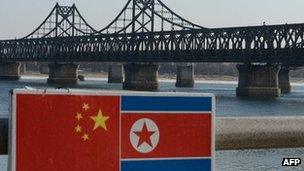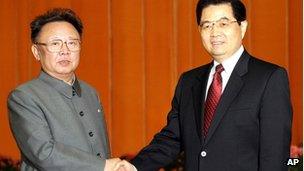Is China ready to abandon North Korea?
- Published

North Korea relies on food and fuel aid from neighbouring China
For years, Chinese diplomats have stuck to a carefully-worded script when discussing tensions between North and South Korea and the US.
"All parties should engage in dialogue," reads a typical quote. "China wants to preserve peace and stability on the Korean Peninsula."
But recently, China's Communist leaders have deviated from their list of stock phrases, allowing their apparent frustration with Pyongyang to seep into public view.
In early April, China's new president, Xi Jinping, delivered the rhetorical equivalent of a rap on the knuckles to Pyongyang.
"No one should be allowed to throw a region and even the whole world into chaos for selfish gains," Mr Xi warned during a speech at the Boao forum on the Chinese island of Hainan.
The Chinese president did not mention any country by name, but it is widely believed that his words were aimed at Pyongyang.
'Trouble-making'
One day earlier, Chinese Foreign Minister Wang Yi echoed a similar level of annoyance with Kim Jong-un's regime, telling UN Secretary Ban Ki-Moon that Beijing opposed "provocative words and actions from any party in the region".
He added that the Chinese leadership would "not allow trouble-making on China's doorstep."
Earlier this week, South Korean press suggested that China was conducting military exercises close to its border with North Korea, though these reports have been denied by the Chinese government.
However, the officials in one small city in China's northeast Jilin province, Hunchun, are taking their own precautions.
For the first time in the city's history, residents practiced emergency drills in which citizens were herded into emergency bunkers to the sound of sirens.
Hunchun officials denied the drills were related to the current political tensions, although China's state-run media acknowledged they were taking place "against the backdrop of North Korea".
Clearly, some people in China no longer believe that China and North Korea are rock-solid allies.
Decades ago, China and North Korea forged a relatively close relationship based on shared historical and ideological ties. But that relationship has entered a dark period.
"Since North Korea's nuclear test in February, there has been no high-level official contact and the relationship on both sides is relatively cold," explains Professor Su Hao of China's Foreign Affairs University.
Links between the two countries failed to recover after the death of Kim Jong-il last year, some argue. When Kim Jong-un came to power, he failed to pay his respects to the leaders in Beijing who were providing his regime with the majority of North Korea's food and fuel aid.
"In comparison with his grandfather and his father, China has minimal personal contact with the young leader," says Cheng Xiaohe, deputy director at the Center for China's International Strategic Studies at Renmin University in Beijing.
"When this young guy came to power, he tried to show his tough face to the US and South Korea, but also to China."
'Unwelcome distraction'
Now, some academics and journalists in China are openly pushing Beijing to rethink its policy on North Korea.
In February, Financial Times newspaper published an op-ed article titled "China Should Abandon North Korea". Its author, editor Deng Yuwen, argued that Beijing should support Korean reunification.
He was later dismissed from his job after the Chinese foreign ministry called to complain about the article.
Mr Deng's position received support on China's internet forums, though he appears to be in the minority.
Many prominent government officials want China to maintain the status quo with North Korea, for all the usual reasons: millions of North Korean refugees could pour across China's borders if the Kim regime collapsed, creating additional economic pressures for Beijing.

Mr Xi's predecessor, Hu Jintao (right), enjoyed warmer relations with Mr Kim's father Kim Jong-Il
Also, a unified Korea might align with Washington, the thinking goes, leaving China with a US ally right on its border.
However, that is an outdated concern that only made sense decades ago, says Dr Cheng Xiaohe.
"China is a formidable country with a large economy and a modern military," he explains.
"China is not afraid of being invaded or circled by any country."
At the same time, China is busy with its own domestic troubles and Beijing's own regional tensions in the South and East China Seas. Increased troubles from Pyongyang are an unwelcome distraction.
Chinese diplomats are attempting to defuse the problem by embracing strongly worded diplomacy and United Nations sanctions to keep Pyongyang in line.
If that fails, more direct action might be taken by reducing fuel aid, as Beijing has done in the past.
If those measures fail to work, Beijing's leaders may come to miss the relatively stable days of the elder Kims.
"Peace, like air and sunshine, is hardly noticed when people are benefiting from it," Chinese President Xi Jinping noted in his opening speech at Boao. "But none of us can live without it."
- Published5 April 2013
- Published8 March 2013
- Published5 March 2013